PREVIOUS: GREECE-IRELAND-ENGLAND
AMERICA 1869 -1890
NEW YORK 1869
Lafcadio Hearn arrived in New York late in 1869. Throughout his life he never mentioned these first few weeks in America. Nearly broke he made his way to Cincinnati.
CINCINNATI 1869-77

Hearn at 23 in Cincinnati.
Hearn arrived in Cincinnati hungry, tired, unkempt,and without money. He was 19. There he became close friends with an older man, Henry Watson, who got him a menial job at his printing shop and eventually helped him to get a position as a "reporter" on the Enquirer, through some "feature" articles Hearn had shyly deposited upon the chief editor's desk.
Henry Watson would remain his close friend for the next 20 years, and Lafcadio's affectionate letters to the "Old Man" are the main source of our knowledge from those years.
MEMPHIS 1877
A LETTER FROM THE RAVEN
Lafcadio left Cincinnati for New Orleans in 1877. He went by rail as far as Memphis and then used the steamer "Thompson Dean" down the Mississippi to New Orleans. As usual he was penniless, and when the steamer was late, he had to wait a week in a dismal hotel at the harbor front. In his morose mood he wrote a letter to his old friend Henry Watkin illustrated with a prophetic drawing of the "Raven", a name Watkin had given him on account of his black hair and gloomy visions:
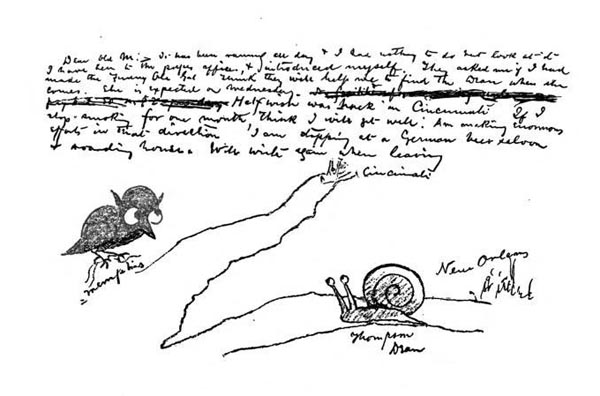
The drawing shows the confluence of the Ohio River and the Mississippi, the snail is labeled "Thompson Dean". It is dated October 31, 1877.
"DEAR OLD DAD : I am writing in a great big,
dreary room of this great, dreary house. It overlooks
the Mississippi. I hear the puffing and the
panting of the cotton boats and the deep calls
of the river traffic; but I neither hear nor see the
Thompson Dean. She will not be here this week,
I am afraid, as she only left New Orleans to-day.
My room is carpetless and much larger than
your office. Old blocked-up stairways come up
here and there through the floor or down from the ceiling, and they suddenly disappear. There
is a great red daub on one wall as though made
by a bloody hand when somebody was staggering
down the stairway. There are only a few panes
of glass in the windows. I am the first tenant of
the room for fifteen years. Spiders are busy spinning
their dusty tapestries in every corner, and
between the bannisters of the old stairways. The
planks of the floor are sprung, and when I walk
along the room at night it sounds as though
Something or Somebody was following me in the
dark. And being in the third story makes
it much more ghostly.
I had hard work to get a washstand and towel
put in this great, dreary room; for the landlord
had not washed his face for more than a quarter
of a century, and regarded washing as an expensive
luxury. At last I succeeded with the assistance
of the barkeeper, who has taken a liking to
me.
I am terribly tired of this dirty, dusty, ugly
town, - a city only forty years old, but looking
old as the ragged, fissured bluffs on which it
stands. It is full of great houses, which were once
grand , but are now as waste and dreary within and
without as the huge building in which I am lodging
for the sum of twenty-five cents a night. I am
obliged to leave my things in the barkeeper's
care at night for fear of their being stolen ; and he
thinks me a little reckless because I sleep with
my money under my pillow. You see the doors
of my room - there are three of them - lock
badly. . . . They are ringing those dead bells every
moment, - it is a very unpleasant sound. I suppose
you will not laugh if I tell you that I have
been crying a good deal of nights, - just like I
used to do when a college boy returned from vacation.
It is a lonely feeling, this of finding oneself
alone in a strange city, where you never meet
a face that you know; and when all the faces you
did know seem to have been dead faces, disappeared
for an indefinite time. I have not travelled
enough the last eight years, I suppose: it does
not do to become attached insensibly to places
and persons. ... I suppose you have had some
postal cards from me; and you are beginning to think I am writing quite often. I suppose I am,
and you know the reason why; and perhaps you
are thinking to yourself: 'He feels a little blue
now, and is accordingly very affectionate, &c.;
but by and by he will be quite forgetful, and perhaps
will not write so often as at present.
Well, I suppose you are right. I live in and
by extremes and am on an extreme now. I write
extremely often, because I feel alone and extremely
alone. By and by, if I get well, I shall
write only by weeks; and with time perhaps only
by months; and when at last comes the rush
of business and busy newspaper work, only by
years, - until the times and places of old friendship
are forgotten, and old faces have become
dim as dreams, and these little spider-threads of
attachments will finally yield to the long strain
of a thousand miles."
Facsimile and text from Letters from the Raven, edited by Milton Bronner, 1907
NEW ORLEANS 1877 - 1889
November 13, 1877, finds Hearn overjoyed
in New Orleans. He would stay in New Orleans for 13 years fighting for his life. His letters to Henry Watkin in Cincinnati tell the story.

New Orleans, Canal Street in 1898, Photo Wikipedia.
In 1881, Hearn succeeded in becoming a member of the
staff of the leading New Orleans paper, the "Times Democrat". With Page Baker, the owner and editor-in-chief of the paper, he formed a salutary and enduring friendship.
Nina Kennan, in her biography of Hearn describes him:
"At this time he was
about five feet three inches in height, his complexion clear
olive, his hair straight and black, his salient features a
long, sharp, aquiline nose and prominent near-sighted eyes,
the left one, injured at Ushaw, considerably more prominent
than the other. In his sensitive, morbid fashion he greatly
over-exaggerated the disfiguring effect this had on his personal
appearance. When engaged in conversation, he habitually
held his hand over it, and was always photographed
in profile looking down."
How much of this description is myth? - An - obviously professional - portrait from the end of the eighties shows him as a conceited Spanish dandy but certainly not destitute:
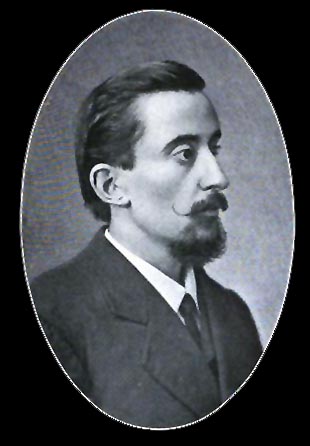
LETTERS FROM THE RAVEN 1878-90
Hearn's Letters from the Raven to Henry Watkin become the diary of his years in New Orleans. Another drawing on a postcard anounces his overjoyed arrival in that city November 13, 1877.
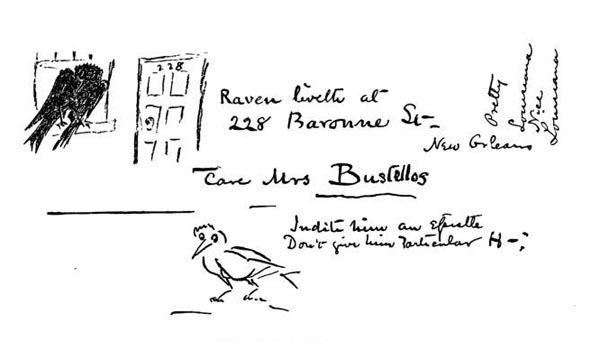
Watkin was busy and couldn't answer immediately. Hearn sent him this black postcard (Nov. 29, 1877):
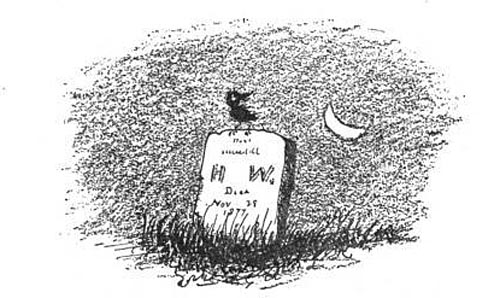
When the reply finally came Hearn wrote a long letter describing his dire situation but also of the delights of New Orleans.
Undated, December 1877
"DEAR OLD FRIEND: I cannot say how glad
I was to hear from you. I am slowly, very slowly, getting
better.... The wealth of a world is here, - unworked
gold in the ore, one might say; the paradise of
the South is here, deserted and half in ruins. I
never beheld anything so beautiful and so sad.
When I saw it first - sunrise over Louisiana -
the tears sprang to my eyes. It was like young
death, - a dead bride crowned with orange flowers, - a dead face that asked for a kiss.
I cannot say
how fair and rich and beautiful this dead South
is. It has fascinated me. I have resolved to live
in it; I could not leave it for that chill and damp
Northern life again. Yes ; I think you could make
it pay to come here. One can do much here with
very little capital. The great thing is, of course,
the sugar-cane business. Everybody who goes
into it almost does well. Some make half a million
a year at it. The capital required to build a sugar
mill, &c., is of course enormous; but men often
begin with a few acres and become well-to-do in
a few years. Louisiana thirsts for emigrants as a
dry land for water. I was thinking of writing to
tell you that I think you could do something in
the way of the fruit business to make it worth
your while to come down, - oranges, bananas, and
tropical plants sell here at fabulously low prices.
Bananas are of course perishable freight when
ripe; but oranges are not, and I hear they sell at
fifty cents a hundred, and even less than that a
short distance from the city. So there are many
other things here one could speculate in. I think
with one partner North and one South, a firm
could make money in the fruit business here. But
there, you know I don't know anything about business. What's the good of asking ME about
business?
If you come here, you can live for almost nothing.
Food is ridiculously cheap, - that is, cheap
food. Then there are first-class restaurants here where the charge is three dollars for dinner. But
board and lodging is very cheap. . . .
I have written twice to the Commerical, but
have only seen one of my letters, - the Forest
letter. I have a copy. I fear the other letters will
not be published. Too enthusiastic, you know.
But I could not write coolly about beautiful Louisiana. . . .
Oh, you must come to New Orleans sometime, - no nasty chill, no coughs and cold. The
healthiest climate in the world. Eternal summer.
It is damp at nights however, and fires are lit
of evenings to dry the rooms. You know the land
is marshy. Even the dead are unburied, - they are
only vaulted up. The cemeteries are vaults, not
graveyards. Only the Jews bury their dead; and
their dead are buried in water. It is water three -
yes, two - feet underground.
I like the people, especially the French; but
of course I might yet have reason to change my
opinion. . . .
Would you be surprised to hear that I have
been visiting my UNCLE? Would you be astonished
to learn that I was on the verge of poverty ?
No. Then, forsooth, I will be discreet. One
can live here for twenty cents a day - what's the
odds? . . .
Yours truly,
THE PRODIGAL SON"
Hearn's letters from New Orleans are such a delight to read that I copied a few more.
After a seven months' hunt for work Hearn
saw some of the hardest times of his life in New
Orleans. The situation, as he described it in the following
letter to Watkin, could not have been worse
than when, as a waif, he wandered the streets
of London.
Postmarked June 14, 1878.
"DEAR OLD MAN: Wish you would tell me
something wise and serviceable. I'm completely
and hopelessly busted up and flattened out, but
I don't write this because I have any desire to
ask you for pecuniary assistance, have asked
for that elsewhere. Have been here seven months
and never made one cent in the city. No possible
prospect of doing anything in this town now
or within twenty-five years. Books and clothes
all gone, shirt sticking through seat of my pants, -
literary work rejected East, - get a five-cent
meal once in two days, - don't know one night
where I 'm going to sleep next, - and am d --d
sick with climate into the bargain. Yellow fever
supposed to be in the city. Newspapers expected
to bust up. Twenty dollars per month is a good
living here; but it's simply impossible to make
even ten. Have been cheated and swindled considerably;
and have cheated and swindled others in retaliation. We are about even. D--n New
Orleans! - wish I'd never seen it. I am thinking
of going to Texas. How do you like the idea? -
to Dallas or Waco. Eyes about played out, I
guess. Have a sort of idea that I can be wonderfully
economical if I get any more good luck.
Can savefifteen out of twenty dollars a month -
under new conditions (?). Have no regular place
of residence now. Can't you drop a line to P. O.
next week, letting shining drops of wisdom drip
from the end of your pen?"
And this description of his ghastly self:
"DEAR OLD MAN: Somehow or other, when a
man gets right down in the dirt, he jumps up again.
The day after I wrote you, I got a position (without
asking for it) as assistant editor on the Item,
at a salary considerably smaller than that I received
on the Commercial (of Cincinnati), but large
enough to enable me to save half of it. Therefore
I hasten to return Will's generous favor with
the most sincere thanks and kindest wishes. You would scarcely know me now, for my face is thinner
than a knife and my skin very dark. The
Southern sun has turned me into a mulatto. I
have ceased to wear spectacles, and my hair is wild
and ghastly. I am seriously thinking of going into
a fraud, which will pay like hell, - an advertising
fraud: buying land by the pound and selling
it in boxes at one dollar per box. I have a party
here now who wants to furnish bulk of capital
and go shares. He is an old hand at the dodge.
It would be carried along under false names, of
course; and there is really no money in honest
work. ... I think I shall see you in the fall or
spring; and when I come again to Cincinnati, it
will be, my dear old man, as you would wish, with
money in my pocket. It did me much good to
hear from you ; for I fancied my postal card asking
for help might have offended you; and I
feared you had resolved that I was a fraud. Well,
I am something of a fraud, but not to everybody. ...
I don't like the people here at all, and
would not live here continually. But it is convenient
now, for I could not live cheaper elsewhere"
Letters from Dryades Street 1880-82
1881-82 Hearn jointly with a partner finally opened a restaurant - "to make money off the poorest" he writes to Watkin. He reports to Henry in a most sarcastic letter.
"MY DEAR OLD MAN : Your style of correspondence -
four letters a year - leads me to suppose
that the fate of the Raven is of little consequence.
It was therefore with surprise that I
heard of a letter concerning It being received
at the Item office. The letter warranted the assumption
that you had at least some curiosity, if
nothing better, in regard to It. That curiosity
should be gratified. The Raven keepeth a restaurant
in the city of New Orleans. It is secretly in
business for itself. It is also in the newspaper
business. The reason It has gone into business
for itself is that It is tired of working for other people. The reason that It is still in the newspaper
line is that the business is not yet paying,
and needs some financial support. The business
is the cheapest in N. O. All dishes are five cents.
Knocks the market price out of things. The
business has already cost about one hundred
dollars to set up. May pay well; may not. The
Raven has a partner, - a large and ferocious man,
who kills people that disagree with their coffee.
The Raven expects to settle in Cuba before long.
Is going there to reconnoitre in a few months, -
if Fortune smileth. It has mastered the elements
of Spanish language, and has a Spanish tutor
who comes every day to teach It.
The Raven would not objecl: to see the O.M.
again, - on the contrary, he is filled with CURIOSITY
to see him. The Raven may succeed right
off. He may not. But he is going to succeed
sooner or later, even if he has to start an eating-
house in Hell. He sends you his respedts, - reserving
his affection for a later time."
Hearn enclosed a yellow handbill
advertising his restaurant.:
"THE 5-CENT RESTAURANT
160 Dryades Street
This is the cheapest eating-house in the South. It is neat,
orderly, and respectable as any other in New Orleans. You
can get a good meal for a couple of nickels. All dishes 5
cents. A large cup of pure Coffee, with Rolls, only 5 cents.
Everything half the price of the markets. "
The venture ended as might have been expected.
Hearn had not inherited the commercial instincts of his ancestors, his
partner robbed him of all the money he had invested,
and decamped, leaving him saddled with the restaurant
and a considerable debt. A swindling building
society seems to have absorbed the rest of his
savings.
Facsimiles and excerpts from Letters from the Raven, edited by Milton Bronner, 1907
GRAND ISLE 1884
In 1884 Hearn went to Grande Isle, in the Archipelago
of the Gulf, for his summer holiday.
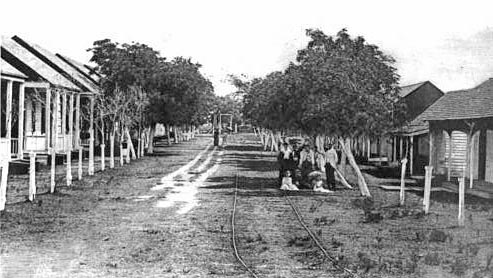
He lived in the shack on the left. The center of the group of the vaguely discernable young people may be Elizabeth Bisland.
It was during this visit to Grande Isle that he wrote "Chita". Fostered by Elizabeth Bisland Chita appeared in Harper's Magazine under the title of "Torn Letters"
CHITA - THE STRENGTH OF THE SEA
"At a
hasty glance, the general appearance of this marsh verdure is vague enough, as
it ranges away towards the sand, to convey
the idea of amphibious vegetation, -
a primitive flora as yet undecided
whether to retain marine habits and
forms, or to assume terrestrial ones ; -
and the occasional inspection of surprising
shapes might strengthen this fancy:
Queer flat-lying and many- branching
things, which resemble sea-weeds in juiciness
and color and consistency, crackle
under your feet from time to time; the
moist and weighty air seems heated rather
from below than from above, - less by
the sun than by the radiation of a cooling
world ; and the mists of morning or
evening appear to simulate the vapory
exhalation of volcanic forces, - latent, but
only dozing, and uncomfortably close to
the surface.
The family of a Spanish fisherman, Feliu Viosca, once occupied and gave its
name to such an islet, quite close to the
Gulf-shore, - the loftiest bit of land along
fourteen miles of just such marshy coast. Landward, it dominated
a desolation that wearied the eye
to look at, a wilderness of reedy sloughs,
patched at intervals with ranges of bitter-
weed, tufts of elbow-bushes, and broad
reaches of saw-grass, stretching away to
a bluish-green line of woods that closed
the horizon, and imperfectly drained in
the driest season by a slimy little bayou
that continually vomited foul water into the sea.
Savage fishermen, at some unrecorded
time, had heaped upon the eminence a
hill of clam-shells, - refuse of a million
feasts; earth again had been formed over
these, perhaps by the blind agency of
worms working through centuries unnumbered;
and the new soil had given
birth to a luxuriant vegetation.
Millennial
oaks interknotted their roots below
its surface, and vouchsafed protection to
many a frailer growth of shrub or tree, -
wild orange, water-willow, palmetto, locust,
pomegranate, and many trailing tendrilled things, both green and gray.
Then, -
perhaps about half a century ago,- a few white fishermen cleared a place for
themselves in this grove, and built a few
palmetto cottages, with boat-houses and
a wharf, facing the bayou. Later on this
temporary fishing station became a permanent
settlement : homes constructed
of heavy timber and plaster mixed with
the trailing moss of the oaks and cypresses
took the places of the frail and fragrant
huts of palmetto.
Still the population
itself retained a floating character :
it ebbed and came, according to season
and circumstances, according to luck or
loss in the tilling of the sea. Viosca, the
founder of the settlement, managed to do well.
He owned several luggers and sloops,
which were hired out upon excellent
terms; he could make large and profitable
contracts with New Orleans fish-dealers;
and he was vaguely suspected of possessing more occult resources.
There
were some confused stories current about
his having once been a daring smuggler,
and having only been reformed by the
pleadings of his wife Carmen, - a little
brown woman who had followed him
from Barcelona to share his fortunes in
the western world.
On hot days, when the shade was full
of thin sweet scents, the place had a
tropical charm, a drowsy peace. Nothing
except the peculiar appearance of the line
of oaks facing the Gulf could have conveyed
to the visitor any suggestion of
days in which the trilling of crickets and
the fluting of birds had ceased, of nights
when the voices of the marsh had been
hushed for fear. In one enormous rank
the veteran trees stood shoulder to shoulder,
but in the attitude of giants overmastered, -
forced backward towards the prostrate trees ; but the rest of the oaks stood on, and strove in line, and saved
the habitations defended by them. . . .
Before a little waxen image of the
Mother and Child, - an odd little Virgin
with an Indian face, brought home by
Feliu as a gift after one of his Mexican
voyages. - Carmen Viosca had burned
candles and prayed; sometimes telling
her beads; sometimes murmuring the
litanies she knew by heart; sometimes
also reading from a prayer-book worn and
greasy as a long-used pack of cards. It
was particularly stained at one page, a
page on which her tears had fallen many
a lonely night - a page with a clumsy
wood-cut representing a celestial lamp, a
symbolic radiance, shining through darkness,
and on either side a kneeling angel.
Photo and excerpts from Lafcadio Hearn, "Chita. The Legend of l'Isle Derniere," 1922
THE GREAT HURRICANE 1884

Before the storm, Grand Island.
Photo
Panoramio
The high point of Chita is his description of the Great Hurricane:
A MEMORY OF "LAST ISLAND"
1884
Je suis la vaste melee, —
Reptile, etant Fonde ; ailee,
Etant le vent, —
Force et fuite, haine et vie,
Houle immense, pour suivie
Et pour suivant. —
VICTOR HUGO.
"Sometimes on autumn evenings, when the
hollow of heaven flames like the interior of a chalice,
waves and clouds are flying in one wild rout of
broken gold....
....In the half-lull between two terrible gusts there
came a sound that seemed
strange in that night of multitudinous terrors -
a sound of music!
Almost every evening throughout the season
there had been dancing in the great hall; - there
was dancing that night also. The population of the
hotel had been augmented by the advent of families from other parts of the island, who found their
summer cottages insecure places of shelter: there
were nearly four hundred guests assembled.
Perhaps
it was for this reason that the entertainment
had been prepared upon a grander plan than usual,
that it assumed the form of a fashionable ball. And
all those pleasure- seekers mingled
joyously.
Half an hour might have passed; still the lights
flamed calmly, and the violins trilled, and the perfumed
whirl went on. . . . And suddenly the wind
veered!
Again the ship reeled, and shuddered, and turned,
and began to drag all her anchors. But she now
dragged away from the great building and its lights -
away from the voluptuous thunder of the grand
piano - even at that moment outpouring the great
joy of Weber's melody orchestrated by Berlioz:
"l'Invitation a la Valse" - with its marvelous musical
swing! ....
Suddenly someone shrieked in the midst of the revels; -
some girl who found her pretty slippers wet.
What could it be? Thin streams of water were
spreading over the level planking - curling about
the feet of the dancers. . . . What could it be? All
the land had begun to quake, even as, but a moment
before, the polished floor was trembling to the
pressure of circling steps; - all the building shook
now; every beam uttered its groan. What could
it be? . . . For a moment there was a ghastly hush of voices.
And through that hush there burst upon the ears of
all a fearful and unfamiliar sound, as of a colossal
cannonade - rolling up from the south, with volleying
lightnings.
One crash ! - the huge frame
building rocks like a cradle, seesaws, crackles. What
are human shrieks now? - the tornado is shrieking!
Another! - chandeliers splinter; lights are dashed
out; a sweeping cataract hurls in: the immense hall
rises - oscillates - twirls as upon a pivot - crepitates -
crumbles into ruin. Crash again! - the
swirling wreck dissolves into the wallowing of another
monster billow; and a hundred cottages over-turn, spin in sudden eddies, quiver, disjoint, and
melt into the seething. ...
So the hurricane passed - tearing off the
heads of the prodigious waves, to hurl them a hundred
feet in air - heaping up the ocean against the
land - upturning the woods. Bays and passes were
swollen to abysses; rivers regorged; the sea-marshes
were changed to raging wastes of water. Before New
Orleans the flood of the mile-broad Mississippi rose
six feet above highest water-mark.
And over roaring Kaimbuck Pass - over the
agony of Caillou Bay - the billowing tide rushed
unresisted from the Gulf - tearing and swallowing
the land in its course - ploughing out deep-sea
channels where sleek herds had been grazing but a
few hours before - rending islands in twain - and
ever bearing with it, through the night, enormous
vortex of wreck and vast wan drift of corpses. . . .
But the ship remained....
Next morning, as the tremendous tide withdraws its plunging
waters, all the pirates of air follow the great white-
gleaming retreat: a storm of billowing wings and
screaming throats.
And swift in the wake of gull and frigate-bird the
Wreckers come, the Spoilers of the dead - savage
skimmers of the sea - hurricane-riders wont to
spread their canvas-pinions in the face of storms;
Sicilian and Corsican outlaws, Manila-men from
the marshes, deserters from many navies, Lascars,
marooners, refugees of a hundred nationalities -
fishers and shrimpers by name, smugglers by
opportunity - wild channel-finders from obscure
bayous and unfamiliar chenieres, all skilled in the
mysteries of these mysterious waters beyond the
comprehension of the oldest licensed pilot. . . .
There is plunder for all - birds and men. There
are drowned sheep in multitude, heaped carcasses of
kine. There are casks of claret and kegs of brandy
and legions of bottles bobbing in the surf. There are
billiard-tables overturned upon the sand; - there
are sofas, pianos, footstools and music-stools,
luxurious chairs, lounges of bamboo. There are
chests of cedar, and toilet-tables of rosewood, and
trunks of fine stamped leather stored with precious
apparel. There are objets de luxe innumerable.
There are children's playthings: French dolls in
marvelous toilets, and toy carts, and wooden horses,
and wooden spades, and brave little wooden ships
that rode out the gale in which the great Nautilus went down. There is money in notes and in coin -
in purses, in pocketbooks, and in pockets: plenty of
it! There are silks, satins, laces, and fine linen to
be stripped from the bodies of the drowned - and
necklaces, bracelets, watches, finger-rings and fine
chains, brooches and trinkets. . . . "Chi bidizza! -
Oh! chi bedda mughieri! Eccu, la bidizza!"
Thrice the great cry rings rippling through the
gray air over the green sea, over the far-
flooded shell-reefs, where the huge white flashes are
sheet-lightning of breakers, and over the weird
wash of corpses coming in. It is the steam-call of the relief-boat, hastening to rescue the living, to gather in the dead.
The tremendous tragedy is over!"
CHITA
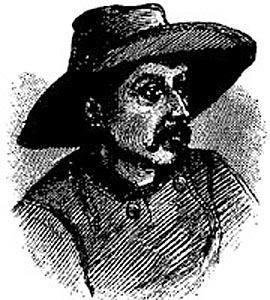
Feliu Viosca
"Out of the debries of the Huricane, Feliu Viosca, a local fisherman rescued a half-drowned, four-year old girl and revives her. She has blond hair and speaks a few sentences of local French patois. . Her mother is dead. Nobody has ever seen the blond creature. The fisherman and his wife Carmen raise her like a gift from Heaven. They name her Chita - Conchita Viosca."
Many years later Julien La Brierre comes to the forlorn village on Grand Isle during an attack of Malaria. - The fisherman's wife nurses him, and in his delirium he recognizes Chita as his lost daughter....
Hearn leaves the end open. We don't find out whether Julien dies or departs with his child... The novella, inspired by a grave stone in New Orleans, is full of wild, dramatic descriptions of the land and the hurricane. I have reproduced some parts, but left the heart-wrenching story of Chita alone.
See for yourself : Lafcadio Hearn, "Chita. The Legend of l'Isle Derniere,"
ELIZABETH BISLAND 1882
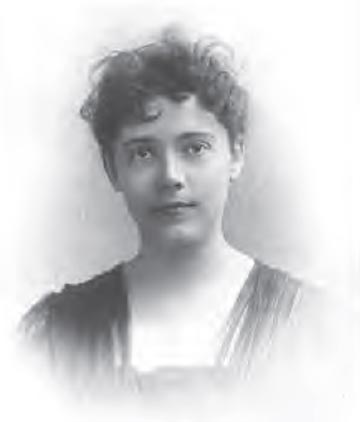
Elizabeth Bisland
In 1882 Hearn made the acquaintance of Elizabeth Bisland. She was about 16 when he first met her. She had a salaried position at the Orleans Times-Democrat for which she wrote poetry, stories and women articles. She struggled as much as Hearn, They recognized in each other
that close kinship of spirit which is the foundation of perfect friendship, and so long as he lived the relationship remained unclouded and unchanged beyond his death in 1904.(2)
There exist but a few letters between them though, mostly written 20 years later. In one from Japan he refers to those first
years of friendship:
"I remember nothing else -
only the sound of her voice - low and clear and at times like a flute: Her Voice and a Thought - multiple, both,
exceedingly - but justifying the imagination of une jeunne fille un
peu farouche (there is no English word that gives the same sense of shyness and force) who came into New Orleans from the country, and wrote nice things for the paper there, and was so kind to a particular savage that he could not understand - and
was afraid of."(3)
At the same time as Hearn was staying on Grand Isle Elizabeth was the center of a circle of young people there. But Lafcadio, as much as he was attracted by her, studiously avoided her. (1)
Soon after (1886) she accepted a position at Harper's in New York and fled from New Orleans - and their increasingly intimate relationship:...
As soon she was out of reach, he was able to write to her:
"So it was you and not I, that was to run away. . . . When I saw the charming notice about you in the Tribune there
suddenly came back to me the same vague sense of un-
happiness I had dreamed of feeling, - an absurd sense of
absolute loneliness. ... I thought I might be able to coax a photo-gravure from you ; but as you are never the same person two minutes in succession, I am partly consoled ; it would only be one small phase of you, Proteus, Circe, Undine, Djineeyeh! . . ." (4)
He visited her twice in New York, 1877 and in 1889 when he accepted an offer by Harper's to do a piece on the West Indies, which Elizabeth had got him, he wrote a last hurried note to her: "...I think I am right in going;
perhaps I am wrong in thinking of making the tropics a
home. Probably it will be the same thing over again:
impulse and chance compelling another change.
The carriage — no, the New York hack and hackman (no romance or sentimentality about these!) is waiting to
take me to Pier 49 East River. So I must end...." (4)
After Hearn had gone to Japan Elizabeth married a Mr. Witmore. There exist another 12 letters to Elizabeth from Hearn's last four years in Japan (1900-1904). Already before his death Elizabeth became the editor of several of Hearn's books, wrote a biography, and published some of his letters (4).
(1) The Grass Lark, A Study of Lafcadio Hearn, by Elizabeth Stevenson, 1998
(2) Elizabeth Bisland by Catherine Verdery. Library of Southern Literature, Vol 13, 1910
(3) Elizabeth Bisland, by Catherine Verdery, op. cit.
(4) More Letters to Elizabeth Bisland (search book for "Bisland"),
Elizabeth Bisland, 1906
NEXT: MARTINIQUE-WEST INDIES










